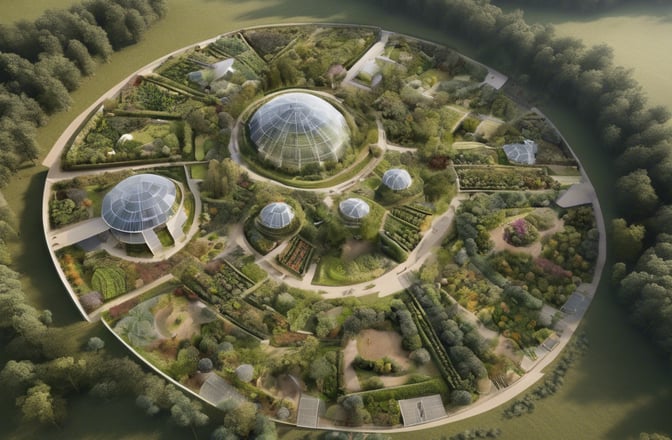Cultivating organisational integrity
Some thoughts around organisational integrity and the unavoidable implications of adopting strong or lofty ideals into an organisational mission mission - with both a moral and a business support for the notion that developing organisational integrity is one of the most important aspects of cultivating thriving organisations that can create and sustain real positive impact.
Melvin Jarman
8/5/20243 min read


In order to adequately frame this discussion I am going to draw on the ideas of Jean Gebser and Rudolf Steiner, as well as some further OD concepts, experiences in hospitality and social enterprise, topics from my time teaching organisation behaviour and leadership, and from the most powerful teacher of them all - nature.
Both Gebser and Steiner suggest that we are evolving into a new kind of consciousness, one that is characterised as a holistic and integrated consciousness. This involves transcending narrow, compartmentalised perspectives in favour of a more comprehensive understanding of reality. Both emphasise that there is a spiritual dimension that needs to be fully acknowledged and realised in order to attain this new kind of ‘living’ thinking. Both recognize the need for a broader, global perspective in human consciousness. They explore ways in which individuals can develop an awareness that transcends individual, cultural, and national boundaries, whilst gaining connection with their individual creativity and divinity.
A key concept of Gebser is the notion of Time-Freedom: a shift from a linear, sequential understanding of time to a more timeless and time-full awareness. The integral consciousness perceives time as a whole, allowing individuals to engage with the past, present, and future simultaneously.
A key idea from Steiner is the notion of a ‘threefold social order’, where he advocates for the distinction and role-clarification of three distinct yet overlapping areas of society - the cultural, political/judiciary and economic. However, a cautionary note is that in order to manifest such archetypal/ideal notions into the world, a lot of work needs to be done in ‘translating’ these ideals into the physical and temporal context of what is to be developed - otherwise we get something like communism (imprinting/forcing ideals onto reality). Bernard Lievegoed, who applied Steiner’s teachings to organisation development, conceptualises this as ‘squaring the triangle’ - integrating the fourth element to the timeless/archetypal: time/development. He even suggests that this is (or should be) the core mission of Anthroposophy.
From organisation development there are some key points which especially apply to this aspect of the work(!) of manifesting ideals into reality.
The “so what” question: as the field is inherently interested in what works ‘on-the-ground’ (and less interested in the elaborateness or even coherence of a theory in theoretical terms), the response to any idea being presented, is “so what” - “what does this mean in/for practice”, “what is the significance in terms of what we are trying to do”, or “why is this idea being presented? What are you really trying to say/show by bringing this?”
Arising from this position there are then a great many theories that can be useful - I giant toolbox one could say. However, there is then the question of using the tools - choosing the right tool, and the skillfulness of the practitioner.
This conceptualisation of all/any theory being one tool of many, is also very useful in cultivating the integrative and living thinking that both Gebser and Steiner describe. Gone is the notion of ‘The one best way’, and instead a learning attitude is cultivated. Different perspectives can be seen as ‘lenses’ - some very powerful - but they are lesnes (constructs), and as such are but one lens of many. Therefore drawing out conclusions, and especially generalisations, should be done with the utmost caution and mindfulness.
This new integral consciousness (or heart thinking) is a) emergent, and b) different in characteristics to what has led up to it. This means that a) space needs to be given for emergence, together with the understanding that we can only manifest from this place in an experimental manner - this has not been done before. Further, in relation to b), we have to be ever-vigilant that the organisation doesn’t slip back into the way things have been done. This presents a significant challenge in terms of balancing between the commercial needs for structure, efficiency, consistency and accountability, with the evolutionary and human needs for dynamism, connection, community participation, a sense of purpose, and a feeling of aliveness.
A key theme in my past experiences (especially working in organisations with strong idealism and/or spiritual underpinnings), is that of integrity. As organisation theorists Argyris and Schön noted, organisations who have a close match between espoused ideals/theories and the actually enacted ‘theory-in-use’ (walk/talk congruence), tend to be the most effective (in whatever it is they are trying to achieve). It is therefore not a leap to infer that if an organisation espouses very high ideals, it has given itself a big task in terms of behaviourally living up to and enacting these ideals. This applies equally to individuals too. If we have a big gap between what we tell ourselves and others about the way we do, and the actual behaviour we enact, then others will find it hard to jústify following our directives (and we will not be at peace).
